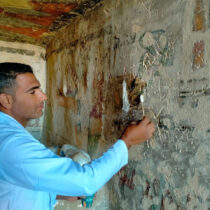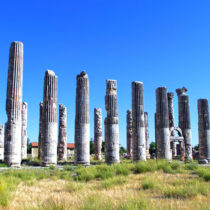“Life is Short but Art is Long” opens in the Pera Museum of Istanbul (Turkey) on February 11, 2015. It will last until April 26, 2015 and is organized by the Pera Museum and the Suna & Inan Kıraç Foundation.
This exhibition takes its name from the famous aphorism by Hippocrates and examines the art and practice of healing in Byzantium from Roman times to the late Byzantine period.
Curated by Dr. Brigitte Pitarakis, Life Is Short, Art Long examines faith, magic, and rational medicine as methods of healing. It traces the “art of healing” from the foundations laid by Apollo and Asklepios, healers of antiquity, and Hippocrates and Dioscorides, the founders of rational medicine and also examines the roles of the physician saints. Among the other topics covered and objects on display are icons, reliquaries, and amulets, marble carvings, medical equipment, plants and herbs, medical and botanical manuscripts, and the centers of healing and miracle in Istanbul.
The ancient heroes of divine healing (Apollo, Asklepios) and the fathers of rational medicine and pharmacology (Hippocrates and Dioscorides) provide a framework for the exploration of the concurrent healing methods that were available to the Byzantines (faith, magic, rational medicine).
The places of healing and miraculous shrines of the Byzantine capital will be examined together with a broad range of objects of various sizes and materials (medical and botanical manuscripts, marble carvings, icons, reliquaries, pilgrimage souvenirs, gems, amulets, medical tools, plant specimens, skeletons, old printed books and engravings, archival photographs).
By contrasting the ideas of illness and wellness, the exhibition will attempt to explore the motivations and fears of Byzantine society from a new perspective. From emperors to military officers, intellectuals, practitioner doctors (male and female), apothecaries, common people in search of healing (physical or mental), men, women, and children, the exhibition will provide exciting new insights into the Byzantine citizens of Istanbul.
The works offering insight into Istanbul’s Byzantine past have been loaned from the Istanbul Archaeological Museums, the Greek Orthodox Patriarchate of Constantinople, the library of the Holy Trinity Monastery of Halki (Heybeliada), the Foundation of the Yeniköy Greek Orthodox Church of Panayia and School, the Rezan Has Museum, the Bibliothèque nationale de France, the Bodleian Libraries of the University of Oxford, Oxford University Herbaria, the Benaki Museum in Athens, the Kastoria Byzantine Museum, and private collections.




